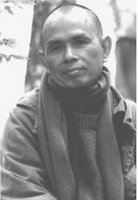At the sight of nothing, the soul rejoices.”
—Meditations on the Monk Who Dwells in Daily Life
Perhaps the greatest modern saint of simple, mindful living is Thich Nhat Hanh, the Vietnamese Buddhist monk who was nominated by Martin Luther King, Jr., for the Nobel Peace Prize. Since the end of the Vietnam conflict, Thay, as he is called by his students, has written dozens of books and become the world’s ambassador for mindfulness.
 Thay recommends very simple practices for waking up the present moment. One of his easiest strategies is to try to utilize normal, everyday sounds as “bells of mindfulness.” When we hear these sounds, we are encouraged to stop whatever we are doing, take a moment to smile and breath, and absorb whatever is going on around and within us. The ringing of the telephone, for example, instead of sending us scrambling to respond to yet another demand, can become our bell of awakening, and we can momentarily resist the urge to answer, collect ourselves back into the present moment, and then pick up the phone with compassion, wisdom and understanding.
Thay recommends very simple practices for waking up the present moment. One of his easiest strategies is to try to utilize normal, everyday sounds as “bells of mindfulness.” When we hear these sounds, we are encouraged to stop whatever we are doing, take a moment to smile and breath, and absorb whatever is going on around and within us. The ringing of the telephone, for example, instead of sending us scrambling to respond to yet another demand, can become our bell of awakening, and we can momentarily resist the urge to answer, collect ourselves back into the present moment, and then pick up the phone with compassion, wisdom and understanding.There is a doorbell at my place of work that automatically rings when visitors enter the building to alert the staff that someone has arrived. It rings several dozen times a day. Thich Nhat Hanh would probably point out the reliability of this bell of mindfulness, and encourage me to use it for mini, instant retreats whenever I need to return to the present moment.




No comments:
Post a Comment